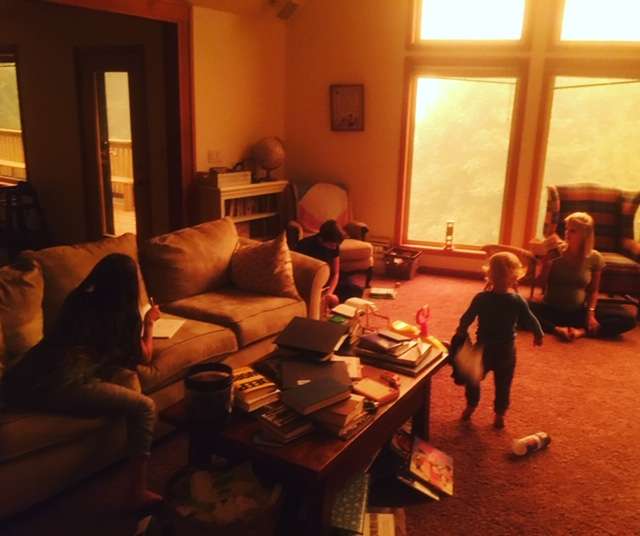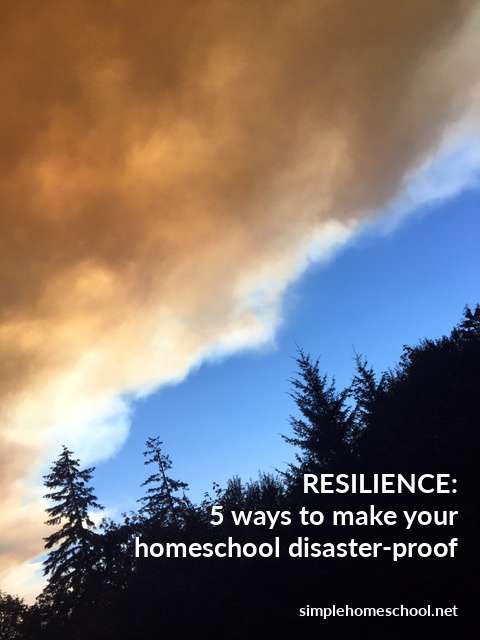Resilience: 5 ways to make your homeschool disaster-proof ~
Written by Kari Patterson
For many families in my area, the first day of school included evacuating their homes.
Due to COVID-19, schools in our area are online for the time being, so just as families were preparing for the steep learning-curve of an entirely new system of education, a severe windstorm and wildfires swept through rural areas, burning more than five million acres along the West Coast.
I was full of fresh enthusiasm that morning, having just made new lesson plans and explained to the kids the schedule for the day, when my phone began buzzing with news of the fires. Soon all our nearby friends had evacuated, and my parents had evacuated to our home.
My mom had just been released from the hospital two hours before, and was completely immobile, so we set to work preparing spaces and making the necessary preparations to care.
Our beautiful blue sky slowly began to disappear…
The nine days that followed brought many twists and turns (and a lot of elevated cortisol).
2020 strikes again!
While this was an unusual event, disasters in general aren’t. If there’s one thing we can count on during our homeschool days, it’s unexpected interruptions.
From slight inconveniences to truly catastrophic emergencies, the more resilience we can develop in our homeschool, the better we’ll fare overall.
Here are a few ways to help make your homeschool disaster-proof:
-
Avoid over-relying on the internet.
I LOVE the resources and and educational possibilities that exist because of the internet! However, for those whose entire educational day revolves around a decent Wifi connection, it’s just too easy to be entirely derailed by a technical malfunction.
We didn’t have internet for our first full week of school, but I was so grateful that the bulk of all our studies could still be completed. This isn’t to say that distance or online learning isn’t a great option, but it’s worth recognizing that an over-reliance on Wifi can make us sitting ducks for frustration and an easily-derailed day.
Consider keeping a few non-screen options for various subjects, or at last a big stack of actual books, on hand.
-
Develop routines that are soothing, not stressful.
I remember hearing a grown-man reminisce about his homeschool experience growing up. Every morning after breakfast, his mother would pull out their current read-aloud and all five of them would curl up with quilts by the wood-stove and begin their day with a story.
Yes, please! Who wouldn’t want to start their day that way?
Of course this will look different for each family, but especially consider your morning routine, the way your school day begins. The blessing of homeschooling is that you don’t have to rush kids out the door, so consider crafting some starting point that each child enjoys.
It doesn’t have to be extravagant or indulgent, but when times are stressful, the hope is that our homeschool routines will actually soothe anxious hearts, rather than heap more stress upon them.
-
Use structure to provide stability.
Of course everyone’s different, but my experience has been that I can actually maintain some homeschool structure through much more than I used to think.
I used to be derailed by just about any distraction or interruption, thinking it would be too hard to homeschool through (fill in the blank with whatever disruption it happens to be this week).
Now, I find that that structure provides us exactly the stability we need.

On our hardest day last week, the sky was red, the house was dark, power was out, fires were getting worse, and I had no idea what was going to happen in the next 24 hours.
Everything felt chaotic, but you know what? The best thing we did was sit down and do our normal day. It made everyone feel a little less anxious.
-
Always, always, always have a great book you’re reading together.

As we sat there in dark and smoke, I was so grateful that our current language-arts study happened to be Corrie Ten Boom’s The Hiding Place, sharing her experience hiding Jews and surviving the Nazi concentration camps during WWII. Talk about perspective!
Sure, there’s a place for sentence-diagramming and grammar worksheets, but there’s nothing like an inspiring story to comfort, inspire, and cultivate hope. Cait recently shared a great article on the importance of reading aloud, along with tips on practical implementation.
All summer I had been debating whether to have each kid do their own independent language-study (reading to themselves) or whether to combine them, read aloud, and do language-arts together.
I knew it would take much more investment and time on my end to do it together, but last week I was so grateful we chose that route! While I’m all for independence, reading aloud together allows you to draw common courage from a shared story.
-
Take full advantage of unusual opportunities for learning and growth.
Let’s continue to cultivate the perspective that interruptions don’t have to be obstacles to education, interruptions are opportunities, and not just the traditional, academic kind.
Taking meals to displaced families, gathering emergency supplies, learning about weather systems, not to mention pitching in practically to help the household function during difficulties–all of these provide a rich, robust educational experience that help develop mature, capable, empathetic, creative, wise, skilled human beings.
These experiences prepare them for far more than filling in bubbles on their next state test, these experiences prepare them for life.
As I type these words Jeff has taken Heidi with him to build a HEPA air-filter for an elderly neighbor. Before that we were delivering meals as families came home from evacuations.
I firmly believe that none of those hours were wasted.
I certainly hope that 2020 has finally finished dolling out disasters, but just in case it hasn’t, let’s do all we can to prepare our hearts and homeschool routines to be as resilient as possible.
How do you try to make your homeschool disaster-proof?
What’s Your Homeschool Mom Personality? Take Jamie’s quiz now and receive a free personality report to help you organize your homeschool based on what your personality type needs most!



 Weekend homeschool links: Sept 18th
Weekend homeschool links: Sept 18th
Love this. Homeschooling while sometimes difficult is one of the most peaceful parts of our day <3
When my daughter went to college she had friends ask her what homeschooling was like. She told them that they got up I made muffins and cocoa and read to them while they are (and for awhile longer as well). Her friends commented when she finished that homeschooling sounded like school with all the bad parts left out. My grandkids are being homeschooled now. Their days recently have included things like tagging and releasing Monarch butterflies my granddaughter raised from caterpillars she found in our pasture, making yogurt as they study microbes, and helping with the end of season garden chores, lots of read alouds, and a regular routine. Our routine, like yours certainly gotten broken by real life on more than one occasion, but we always considered flexibility one of the biggest benefits of homeschooling. My daughter has found that to be the same. Last year they homeschooled at our house for six weeks while they were in between houses. It was a challenge, but also one of the most special times we’ve had with them It gave me a chance to do read alouds with the older two while mommy was getting the nit quite two year old dow for her nap.